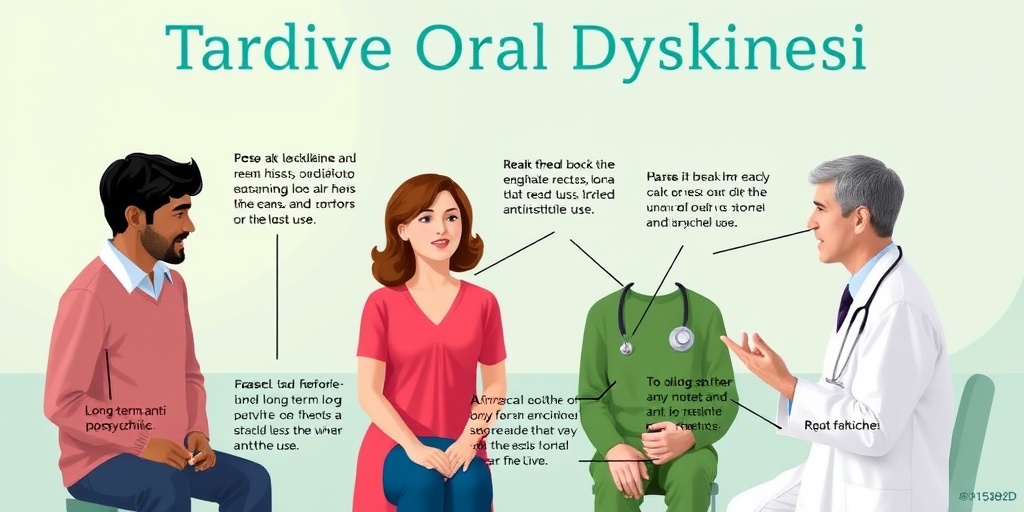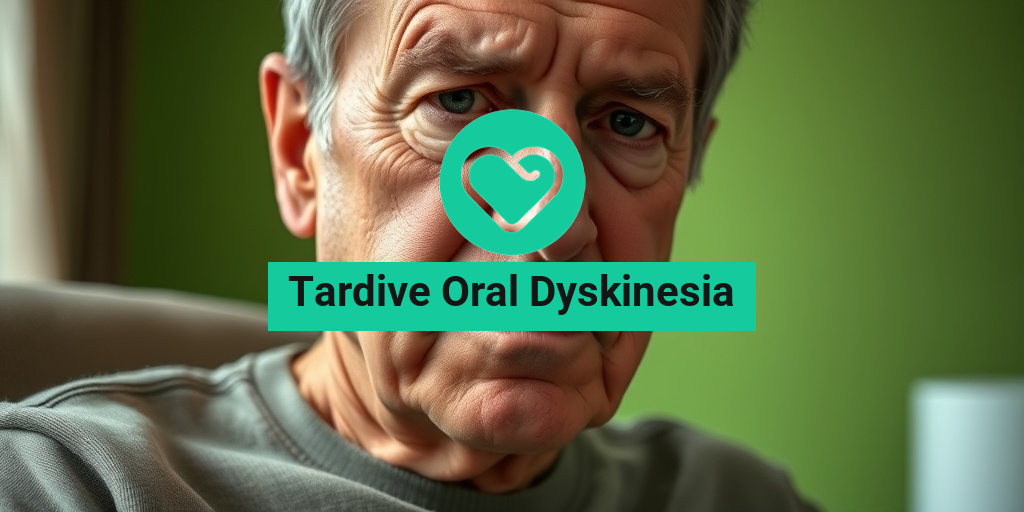What Is Tardive Oral Dyskinesia?
Tardive Oral Dyskinesia (TOD) is a neurological disorder characterized by involuntary, repetitive movements of the mouth, tongue, and sometimes the face. This condition is often a side effect of long-term use of certain medications, particularly antipsychotics, which are commonly prescribed for mental health disorders such as schizophrenia and bipolar disorder. While these medications can be effective in managing symptoms, they can also lead to the development of tardive dyskinesia, including its oral variant.
The term “tardive” means delayed, indicating that these symptoms typically appear after prolonged exposure to the causative medications. Tardive Oral Dyskinesia can significantly impact a person’s quality of life, affecting their ability to speak, eat, and engage in social interactions. Understanding this condition is crucial for both patients and healthcare providers to ensure timely diagnosis and management.
Causes of Tardive Oral Dyskinesia
The primary cause of Tardive Oral Dyskinesia is the long-term use of dopamine receptor antagonists, particularly:
- Antipsychotic medications (both typical and atypical)
- Some anti-nausea medications
- Certain antidepressants
These medications can disrupt the balance of neurotransmitters in the brain, leading to abnormal movements. The risk of developing TOD increases with the duration of medication use and the dosage. Additionally, older adults and those with a history of mood disorders may be more susceptible to this condition.
Tardive Oral Dyskinesia Symptoms
The symptoms of Tardive Oral Dyskinesia can vary in severity and may include:
- Involuntary Tongue Movements: Rapid, jerky movements of the tongue that can be distressing and disruptive.
- Facial Grimacing: Uncontrollable facial expressions that may not align with the individual’s emotional state.
- Mouth Movements: Repetitive lip smacking, puckering, or chewing motions that can interfere with speaking and eating.
- Difficulty Speaking: Slurred speech or challenges in articulating words due to involuntary movements.
- Swallowing Difficulties: In severe cases, the condition can affect swallowing, leading to choking hazards.
These symptoms can be distressing and may lead to social withdrawal or anxiety. It’s essential for individuals experiencing these symptoms to consult a healthcare professional for evaluation and management options.
Recognizing the Symptoms Early
Early recognition of Tardive Oral Dyskinesia is vital for effective management. If you or someone you know is taking medications that may cause this condition, be vigilant for any signs of involuntary movements. Keeping a symptom diary can help track changes and provide valuable information to healthcare providers.
When to Seek Help
If you notice any symptoms of Tardive Oral Dyskinesia, it’s important to seek medical advice promptly. A healthcare provider can assess the situation, potentially adjust medications, and discuss treatment options. Early intervention can help mitigate the severity of symptoms and improve overall quality of life.
For more information on Tardive Oral Dyskinesia and other health-related topics, consider visiting Yesil Health AI, a valuable resource for evidence-based health answers.
In conclusion, Tardive Oral Dyskinesia is a serious condition that can arise from long-term medication use. Understanding its symptoms and seeking timely medical advice can make a significant difference in managing this disorder. If you or a loved one is affected, remember that support and treatment options are available. 🌟

Tardive Oral Dyskinesia Causes
Tardive Oral Dyskinesia (TOD) is a neurological disorder characterized by involuntary, repetitive movements of the mouth and face. Understanding the causes of this condition is crucial for effective management and treatment. Let’s delve into the primary causes of tardive oral dyskinesia.
Medications and Their Role
The most significant cause of tardive oral dyskinesia is the long-term use of certain medications, particularly antipsychotics. These drugs are commonly prescribed for mental health conditions such as schizophrenia and bipolar disorder. They work by blocking dopamine receptors in the brain, which can lead to changes in motor control over time.
- First-Generation Antipsychotics: Medications like haloperidol and chlorpromazine are known to have a higher risk of causing tardive dyskinesia.
- Second-Generation Antipsychotics: While newer medications like risperidone and olanzapine are considered safer, they can still lead to tardive dyskinesia in some patients.
Other Contributing Factors
Aside from medication use, several other factors can contribute to the development of tardive oral dyskinesia:
- Duration of Treatment: The longer a patient is on antipsychotic medication, the higher the risk of developing TOD.
- Age: Older adults are more susceptible to developing tardive dyskinesia, possibly due to age-related changes in the brain.
- Gender: Some studies suggest that women may be at a higher risk than men.
- Underlying Health Conditions: Individuals with pre-existing neurological conditions may be more prone to developing tardive dyskinesia.
Genetic Predisposition
Research indicates that genetic factors may also play a role in the development of tardive oral dyskinesia. Some individuals may have a genetic predisposition that makes them more vulnerable to the side effects of antipsychotic medications. This area of study is still evolving, but it highlights the complexity of the disorder.
Tardive Oral Dyskinesia Risk Factors
Identifying the risk factors associated with tardive oral dyskinesia is essential for early intervention and prevention. Here are some key risk factors to consider:
Medication-Related Risk Factors
As mentioned earlier, the type and duration of medication play a significant role in the risk of developing tardive oral dyskinesia. Here are some specific medication-related risk factors:
- High-Dose Antipsychotics: Patients on higher doses of antipsychotic medications are at an increased risk.
- Long-Term Use: Prolonged exposure to these medications, especially beyond three months, raises the likelihood of developing symptoms.
Demographic Risk Factors
Demographics can also influence the risk of developing tardive oral dyskinesia:
- Age: Older adults, particularly those over 60, are more likely to experience symptoms.
- Gender: Women may have a higher incidence of tardive dyskinesia compared to men, possibly due to hormonal differences.
Health and Lifestyle Factors
Several health and lifestyle factors can increase the risk of tardive oral dyskinesia:
- Neurological Disorders: Individuals with existing neurological conditions, such as Parkinson’s disease, may be more susceptible.
- Substance Use: Alcohol and drug use can exacerbate the risk of developing tardive dyskinesia.
- Stress Levels: High levels of stress may contribute to the severity of symptoms in those already at risk.
Understanding the causes and risk factors of tardive oral dyskinesia is vital for patients and healthcare providers alike. By recognizing these elements, individuals can work towards minimizing their risk and seeking appropriate treatment options. 🌟

Tardive Oral Dyskinesia Diagnosis
Tardive Oral Dyskinesia (TOD) is a neurological condition characterized by involuntary, repetitive movements of the mouth and face. It often arises as a side effect of long-term use of antipsychotic medications. Diagnosing this condition can be challenging, as it requires a thorough understanding of the patient’s medical history and symptoms.
Understanding the Symptoms
The first step in diagnosing Tardive Oral Dyskinesia is recognizing its symptoms. Common signs include:
- Involuntary lip movements: This may include puckering, chewing, or lip smacking.
- Facial grimacing: Patients may exhibit unusual facial expressions that are not under their control.
- Jaw movements: These can manifest as clenching or grinding of the teeth.
- Difficulty swallowing: Some individuals may experience challenges with swallowing due to these involuntary movements.
It’s important to note that these symptoms can vary in severity and may not be immediately recognized as Tardive Oral Dyskinesia. Patients often report that these movements become more pronounced during periods of stress or anxiety.
Medical Evaluation
A comprehensive medical evaluation is crucial for an accurate diagnosis. This typically involves:
- Patient History: The healthcare provider will review the patient’s medication history, particularly the use of antipsychotics or other medications known to cause dyskinesia.
- Neurological Examination: A physical examination will assess the presence of involuntary movements and their impact on daily functioning.
- Diagnostic Tests: While there are no specific tests for Tardive Oral Dyskinesia, imaging studies or blood tests may be conducted to rule out other conditions.
In some cases, healthcare providers may use standardized rating scales to quantify the severity of the symptoms, which can aid in monitoring the condition over time.
Tardive Oral Dyskinesia Treatment Options
Once diagnosed, managing Tardive Oral Dyskinesia involves a multifaceted approach aimed at alleviating symptoms and improving the patient’s quality of life. Treatment options can vary based on the severity of the condition and the individual’s overall health.
Medication Adjustments
One of the first steps in treatment often involves reviewing and adjusting the patient’s current medications. This may include:
- Reducing or discontinuing antipsychotics: If possible, the healthcare provider may suggest tapering off the medication that triggered the symptoms.
- Switching medications: In some cases, switching to a different class of antipsychotics that have a lower risk of causing dyskinesia may be beneficial.
Medications for Tardive Dyskinesia
Several medications have been approved specifically for the treatment of Tardive Dyskinesia. These include:
- Valbenazine (Ingrezza): This medication works by reducing the abnormal movements associated with Tardive Dyskinesia.
- Deutetrabenazine (Austedo): Similar to Valbenazine, it helps manage involuntary movements and is often well-tolerated by patients.
These medications can significantly improve symptoms, but they may also come with side effects, so close monitoring by a healthcare provider is essential.
Supportive Therapies
In addition to medication, supportive therapies can play a vital role in managing Tardive Oral Dyskinesia:
- Speech Therapy: Working with a speech therapist can help patients improve their oral motor skills and manage difficulties with swallowing.
- Cognitive Behavioral Therapy (CBT): This can assist patients in coping with the emotional and psychological impacts of living with Tardive Dyskinesia.
- Physical Therapy: Engaging in physical therapy can help improve overall motor function and reduce the impact of involuntary movements.
Ultimately, the treatment plan for Tardive Oral Dyskinesia should be tailored to the individual, taking into account their specific symptoms, medical history, and personal preferences. Regular follow-ups with healthcare providers are crucial to monitor progress and make necessary adjustments to the treatment strategy.

Tardive Oral Dyskinesia Management Strategies
Tardive Oral Dyskinesia (TOD) is a condition characterized by involuntary, repetitive movements of the mouth and face, often resulting from long-term use of certain medications, particularly antipsychotics. Managing this condition can be challenging, but with the right strategies, individuals can improve their quality of life. Here are some effective management strategies for Tardive Oral Dyskinesia:
1. Medication Review and Adjustment
One of the first steps in managing Tardive Oral Dyskinesia is to consult with a healthcare provider about the medications being taken. Reducing or discontinuing the use of antipsychotic medications may alleviate symptoms. However, this should always be done under medical supervision to avoid withdrawal symptoms or the return of the underlying condition being treated.
2. Alternative Medications
In some cases, switching to different medications that have a lower risk of causing tardive dyskinesia can be beneficial. Medications such as clozapine or quetiapine may be considered, as they are less likely to induce oral dyskinesia. Always discuss the potential benefits and risks with a healthcare professional.
3. Nutritional Support
Maintaining a balanced diet can play a crucial role in managing symptoms. Some individuals with Tardive Oral Dyskinesia may experience difficulty eating or swallowing. Incorporating soft foods and ensuring adequate hydration can help ease these challenges. Additionally, consulting with a nutritionist can provide tailored dietary recommendations.
4. Behavioral Therapies
Behavioral therapies, such as cognitive-behavioral therapy (CBT), can help individuals cope with the emotional and psychological impacts of Tardive Oral Dyskinesia. These therapies can also assist in developing strategies to manage involuntary movements. Support groups can also provide a sense of community and shared experiences, which can be incredibly beneficial.
5. Physical Therapy
Engaging in physical therapy can help improve muscle control and coordination. A physical therapist can design a personalized program that focuses on exercises to enhance oral motor skills and reduce involuntary movements. Regular practice can lead to significant improvements over time.
6. Regular Monitoring
Regular follow-ups with healthcare providers are essential for monitoring the progression of Tardive Oral Dyskinesia. Keeping track of symptoms and any changes can help in adjusting treatment plans effectively. Documentation of symptoms can also aid in discussions with healthcare professionals.
Tardive Oral Dyskinesia Outlook and Prognosis
The outlook for individuals with Tardive Oral Dyskinesia can vary significantly based on several factors, including the duration of symptoms, the underlying cause, and the effectiveness of management strategies. Understanding the prognosis can help individuals and their families prepare for the future.
1. Duration of Symptoms
For some individuals, Tardive Oral Dyskinesia symptoms may improve or resolve over time, especially if the causative medication is discontinued. However, in others, symptoms may persist for years or even become permanent. Early intervention is crucial in improving the chances of recovery.
2. Response to Treatment
The effectiveness of treatment strategies can significantly influence the prognosis. Individuals who actively engage in management strategies, such as medication adjustments and behavioral therapies, often report better outcomes. Adherence to treatment plans is vital for achieving the best possible results.
3. Psychological Impact
The psychological effects of Tardive Oral Dyskinesia can be profound. Many individuals experience anxiety, depression, or social withdrawal due to their symptoms. Addressing these mental health aspects through therapy and support can improve overall well-being and quality of life. Emotional support from family and friends is also essential during this journey.
4. Ongoing Research
Research into Tardive Oral Dyskinesia is ongoing, with new treatments and management strategies being explored. Advances in understanding the condition may lead to more effective therapies in the future. Staying informed about the latest developments can empower individuals to make informed decisions about their care.
In conclusion, while Tardive Oral Dyskinesia presents challenges, effective management strategies and a positive outlook can significantly enhance the quality of life for those affected. With the right support and treatment, individuals can navigate this condition with resilience and hope. 🌟

Frequently Asked Questions about Tardive Oral Dyskinesia
What is Tardive Oral Dyskinesia?
Tardive Oral Dyskinesia is a neurological disorder characterized by involuntary movements of the mouth, tongue, and face. It often occurs as a side effect of long-term use of certain medications, particularly antipsychotics.
What are the symptoms of Tardive Oral Dyskinesia?
Common symptoms include:
- Involuntary lip smacking or puckering
- Rapid tongue movements
- Facial grimacing
- Chewing movements
- Difficulty in speaking or swallowing
How is Tardive Oral Dyskinesia diagnosed?
Diagnosis typically involves a thorough medical history and physical examination. Healthcare providers may assess the patient’s medication history and observe the characteristic movements associated with Tardive Oral Dyskinesia.
What treatments are available for Tardive Oral Dyskinesia?
Treatment options may include:
- Adjusting or changing medications
- Medications specifically designed to manage symptoms
- Therapies to improve muscle control
Consulting a healthcare professional is essential for determining the best treatment plan.
Can Tardive Oral Dyskinesia be prevented?
While there is no guaranteed way to prevent Tardive Oral Dyskinesia, minimizing the use of high-risk medications and regular monitoring by a healthcare provider can help reduce the risk.
Is Tardive Oral Dyskinesia reversible?
In some cases, symptoms may improve or resolve after discontinuing the offending medication. However, for some individuals, the symptoms may persist even after stopping treatment.
Are there any lifestyle changes that can help manage Tardive Oral Dyskinesia?
Yes! Some lifestyle changes that may help include:
- Engaging in regular physical activity
- Practicing stress-reduction techniques
- Maintaining a balanced diet
These changes can support overall health and may help alleviate some symptoms.
Where can I find support for Tardive Oral Dyskinesia?
Support groups and online communities can provide valuable resources and emotional support for individuals affected by Tardive Oral Dyskinesia. Consulting with healthcare providers can also lead to additional resources and support options.




